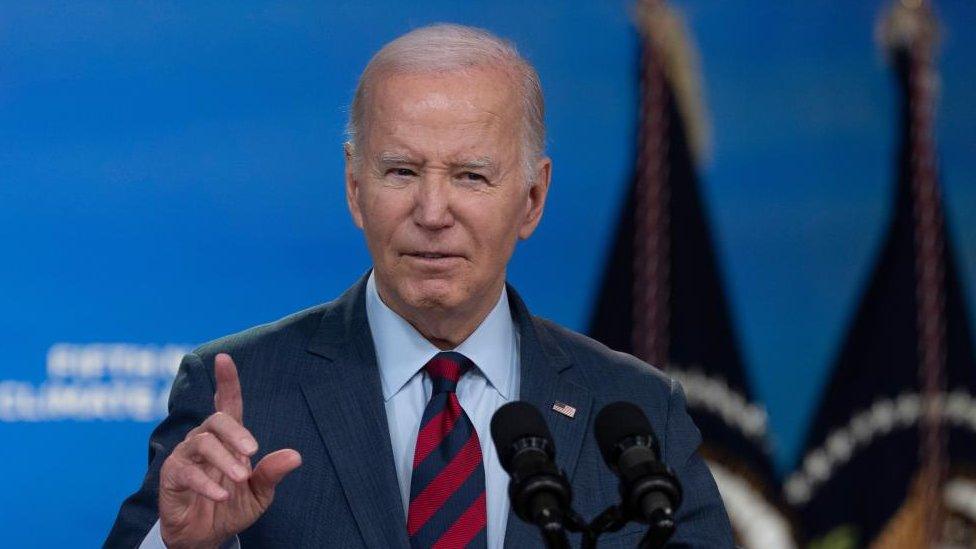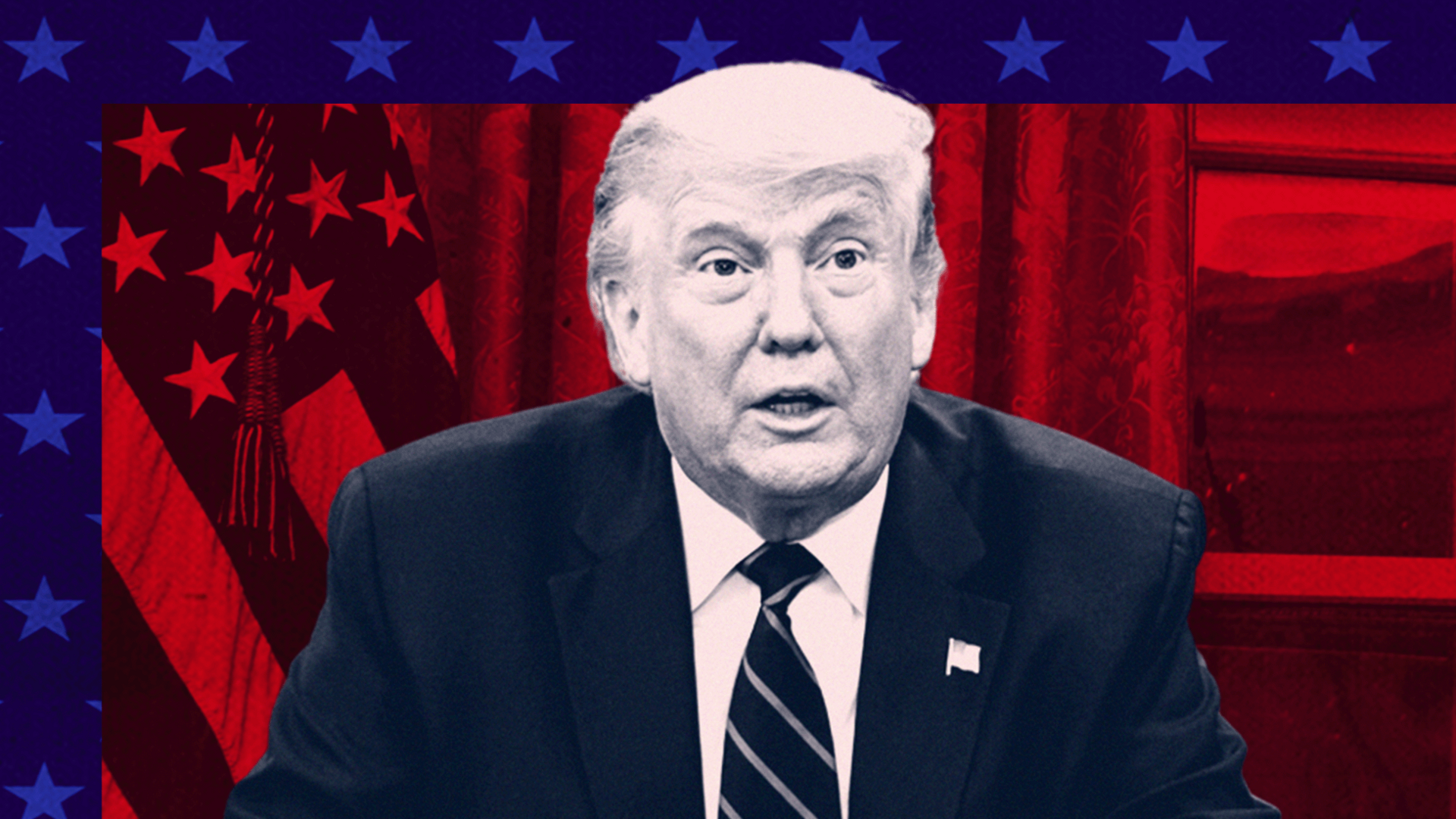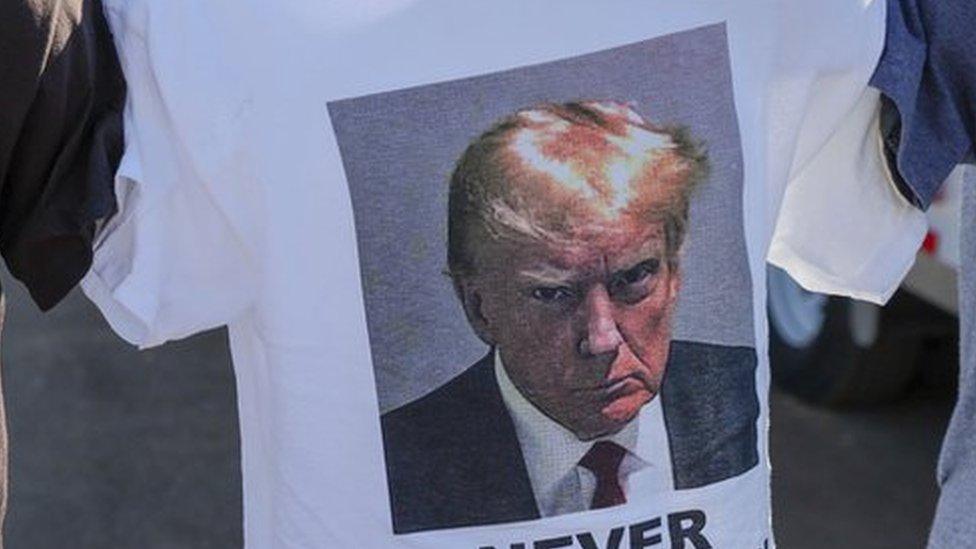Biden says 'vermin' rhetoric by Trump echoes Nazis
- Published

US President Joe Biden has accused his predecessor Donald Trump of using rhetoric echoing that heard in Nazi Germany.
He spoke out after Mr Trump called his political opponents "vermin" during a rally at the weekend.
The remarks show Mr Biden's increased willingness to attack Mr Trump a year before an expected election rematch between the two rivals.
A Trump campaign spokesperson called Mr Biden's accusation "despicable".
"We pledge to you that we will root out the communists, Marxists, fascists and the radical left thugs that live like vermin within the confines of our country," Mr Trump told his supporters on Saturday in New Hampshire as the US marked Veterans Day.
"Our threat is from within," he added.
Speaking at a fundraiser in San Francisco on Tuesday, Mr Biden said: "In just the last few days, Trump has said, if he returns to office, he's gonna go after all those who oppose him and wipe out what he called the vermin, quote, the vermin in America - a specific phrase with a specific meaning."
"It echoes language you heard in Nazi Germany in the '30s," he continued, according to a White House transcript. "And it isn't even the first time."
Mr Trump's campaign did not immediately respond to the BBC's request for comment, though campaign spokesman Steven Cheung told NBC News that Mr Biden had made "a disgusting connection".
"He's clearly suffering from a severe case of Trump derangement syndrome and should get professional help," Mr Cheung added.
Historians and experts who have studied propaganda from Nazi Germany told the BBC that Mr Biden's comparison was accurate.
"It's not only that we heard language like this in Nazi Germany, that's exactly what they actually did," said Anne Berg, a University of Pennsylvania historian, citing the Nazis' attacks, once they took power, against political adversaries.
She did, however, caution against comparing Mr Trump's intent directly to that of the Nazis. "It's an attempt to rile up the masses," said the academic.
The Democratic base has for years likened Mr Trump's rhetoric to language used by dictators.
Mr Biden initially struck more temperate tone, portraying himself as a healer-in-chief during his 2020 campaign against Mr Trump.
But during his presidency, he has more aggressively criticised Mr Trump.
Standing outside Philadelphia's Independence Hall in September 2022, Mr Biden said that Mr Trump and his Make America Great Again movement "represent an extremism that threatens the very foundations of our republic".
That speech provoked accusations from some conservatives that Mr Biden was himself demonising political opponents in the mould of an authoritarian leader.
But it marked a turning point in the Democratic president's stance towards Mr Trump. Mr Biden is now more explicit in arguing that Mr Trump and his allies represent a threat to democracy.
Hasia Diner, a professor of Jewish history at New York University, acknowledged that "all analogies and comparisons based on language are fraught".
"But," she added, "Biden is on target to focus on those words by Trump as Nazi-inflected."
Mr Trump's incendiary language has continued throughout his re-election campaign.
In October, he said immigrants were "poisoning the blood of our country" during an interview with right-wing news outlet The National Pulse.
Yotam Ophir, a lecturer on disinformation at the University of Buffalo, told the BBC the "vermin" rhetoric specifically echoed propaganda films produced by the Nazis, which compared Jewish people to rats and insects.
"While I agree it's politically charged to compare someone to Hitler or Nazi Germany," Mr Ophir said, "I think we should be able to say that calling the whole left side of the political map 'vermin' and a danger to our country is more alarming than saying those claims are reminding us of dark times from the past."
Related topics
- Published2 November 2023

- Published3 November 2023

- Published5 November 2023
